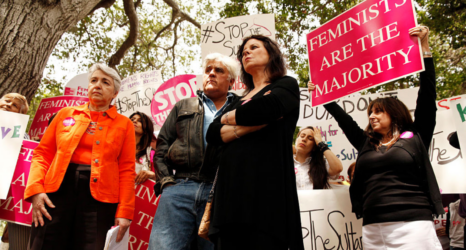Over 2,500 medical professionals are urging the Supreme Court to uphold Roe v. Wade: “Beyond safety and medical necessity, many people simply don’t want to be pregnant, and should have the power to control their own bodies. Period.”

Any day now, the Supreme Court will issue its decision in Dobbs v. Jackson Women’s Health Organization, which many predict will overturn or severely gut Roe v. Wade. Since the start of the Dobbs v. Jackson hearings in December, medical professionals have warned of the drastic health impacts brought on by abortion bans. Now, over 2,500 healthcare professionals from all 50 states have signed a letter urging the Supreme Court to scrap their leaked Dobbs draft opinion and uphold Roe.
Within 30 days of a decision to overturn Roe, at least 26 states will ban abortion. Clinics in remaining pro-abortion states are preparing for increased violence from anti-abortion extremists and an influx of out-of-state patients. The number of legal abortions performed nationwide is projected to fall by about 13 percent. Many abortion clinics in states with bans will be forced to close their doors, if they haven’t already. The loss of these clinics also comes with the loss of the other essential reproductive healthcare they provide, including STI screenings and treatment, birth control and cervical cancer screenings.
The letter, titled “Medical Professionals Urge Supreme Court to Uphold Roe v. Wade, Protect Abortion Access,” argues that decisions around pregnancy and abortion should be made by patients and their doctors, not the courts.
It warns that maternal care, fertility treatments, health, safety and economic well-being are all harmed when abortion is banned: “Pregnancy changes a person’s physiology. These changes can potentially worsen existing diseases and medical conditions. … We see the real-life consequences when an individual does not get the care that they know they need, including abortions.”
The letter also highlights how those bans disproportionally affect people who already face barriers to medical care, such as low-income women, rural residents and Black, Indigenous and other minority populations. “Combined with higher maternal mortality rates and worse health outcomes, denying access to abortions only increases health risks and disparities for already disadvantaged people.”
Earlier this month, the Committee to Protect Health Care, which sponsored the open letter, launched their Reproductive Freedom Taskforce to preserve and expand access to reproductive healthcare.
Read the full letter below:
As physicians and health care professionals, we are gravely concerned that the U.S. Supreme Court appears prepared to end the constitutional right to an abortion. We urge the Supreme Court to to scrap their draft opinion, uphold the constitutional right to an abortion, and ensure that abortions remain legal nationwide, as allowed for in Roe v. Wade. In this moment of crisis, we want to make crystal clear the consequences to our patients’ health if they can no longer access abortions.
Abortions are safe, common and a critical part of health care and reproductive medicine. Medical professionals and medical associations agree, including the American Medical Association, the American College of Obstetricians and Gynecologists, the American Academy of Family Physicians, the American College of Nurse Midwives and many others.
Prohibiting access to safe and legal abortion has devastating implications for health care. Striking down Roe v. Wade would affect not just abortion access, but also maternal care as well as fertility treatments. Pregnancy changes a person’s physiology. These changes can potentially worsen existing diseases and medical conditions.
As physicians and medical professionals, we see the real-life consequences when an individual does not get the care that they know they need, including abortions. The woman who has suffered the violation and trauma of rape would be forced to carry a pregnancy.
Denying access to abortion from people who want one can adversely affect their health, safety and economic well-being, including delayed separation from a violent partner and increased likelihood of falling into poverty by four times. These outcomes can also have drastic impacts on their health.
Beyond safety and medical necessity, many people simply don’t want to be pregnant, and should have the power to control their own bodies. Period.
When access to abortion is restricted, people are forced to travel, sometimes thousands of miles. Those without resources may be forced to carry an unwanted pregnancy to term.
These restrictions disproportionately harm those who have limited resources or already face barriers to overall medical care, including low-income and poor people, residents in rural areas, and Black, Indigenous and minority populations. Combined with higher maternal mortality rates and worse health outcomes, denying access to abortions only increases health risks and disparities for already disadvantaged people: Black women are three times more likely to die from pregnancy-related causes than white women, and Indigenous women have pregnancy-related mortality rates twice as high as white women.
Decisions around abortion should be made by pregnant people themselves, in consultation with their health care provider — not politicians and the courts.
As medical professionals, we have a duty to provide our patients with the treatment they need to be safe and healthy. Patients should be able to make their own decisions about their health, using science and medical guidance from their physicians, without interference or influence from politics or the courts. We call on the Supreme Court to abandon their draft decision and uphold Roe v. Wade to protect abortion access across the United States.
Signed by over 2,500 medical professionals in all 50 states. Names hidden from public page for security.
Sign and share Ms.’s relaunched “We Have Had Abortions” petition—whether you yourself have had an abortion, or simply stand in solidarity with those who have—to let the Supreme Court, Congress and the White House know: We will not give up the right to safe, legal, accessible abortion.
Up next:





